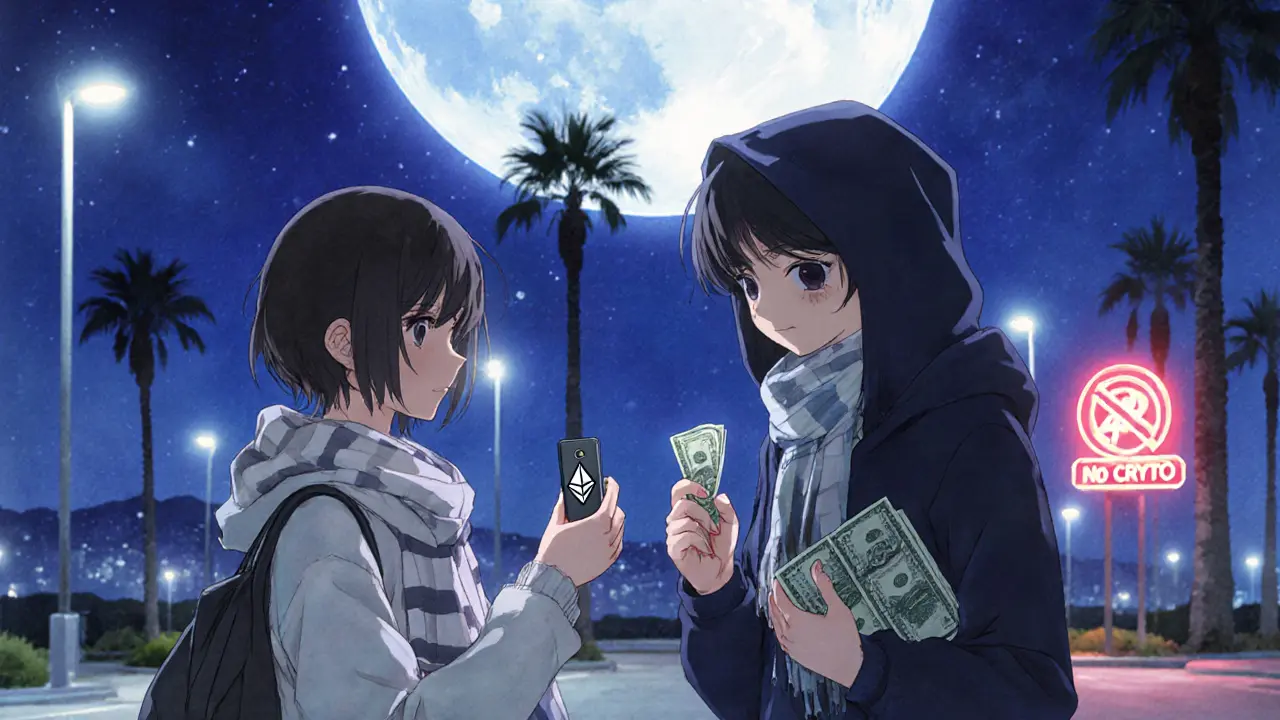Legal Risks for Tunisian Crypto Users and Traders in 2025

Tunisian Crypto Risk Assessment Tool
This tool calculates your legal risk level for cryptocurrency activities in Tunisia based on your current actions. Remember: all cryptocurrency activity is illegal in Tunisia and can result in imprisonment, asset seizure, and fines.
Risk Assessment Form
If you're in Tunisia and you're buying, selling, or holding cryptocurrency, you're breaking the law. Not just a little bit - completely. The Central Bank of Tunisia (BCT) has banned all cryptocurrency activity since 2018, and the penalties aren't warnings. They're jail time. And it's getting harder to hide.
What’s Actually Illegal in Tunisia?
It’s not just trading. Every single crypto-related action is banned. Buying Bitcoin? Illegal. Mining Ethereum with a rig in your garage? Illegal. Accepting Dogecoin for your handmade crafts? Illegal. Even holding crypto in a wallet you didn’t buy locally is against the law. The BCT doesn’t just discourage crypto - it criminalizes it. The 2018 directive makes it clear: no one in Tunisia can use, trade, mine, or promote digital assets. Banks are required to block any transaction linked to crypto. Customs officers can seize your ASIC miners if they find them at the airport. If you’re caught running a crypto exchange - even from your bedroom - you could go to prison for up to five years. And it’s not just individuals. Companies can’t list crypto on their balance sheets. They can’t pay employees in Bitcoin. They can’t even use crypto for international invoices. The law treats crypto like counterfeit money - not as a new asset class, but as a threat to the national currency.Who’s Enforcing This?
Three government bodies are watching every move. The BCT is the main enforcer - they wrote the ban and they keep it alive. The Financial Market Council (CMF) steps in if someone tries to launch a token or security that looks like an investment. And the National Anti-Money-Laundering Commission (CTAF) tracks suspicious transfers, especially those moving money out of Tunisia. Banks are legally required to report any transaction that looks like crypto. If you send $5,000 to Binance or Kraken, your bank will flag it. Your account could freeze. You might get called in for questioning. There are documented cases of people losing access to their savings because a single transfer triggered an alert. Even importing mining equipment is risky. Customs doesn’t just confiscate the hardware - they can charge you under currency control laws. One Tunisian tech student was fined and had his mining rig seized after bringing it in from Turkey. He didn’t even mine it. He just planned to.What Happens If You Get Caught?
The punishment isn’t a fine and a slap on the wrist. It’s prison. Up to five years. That’s the same penalty as money laundering or illegal foreign exchange. And if you made any profit from crypto? The government takes it all. No appeal. No negotiation. They seize your Bitcoin, your earnings, even the cash you traded for it. There’s no gray area. The law doesn’t say “don’t use crypto unless you’re careful.” It says “don’t use crypto, period.” There are no licenses for exchanges. No legal wallets. No registered traders. Even if you think you’re being smart - using a VPN, trading peer-to-peer, hiding your keys - you’re still breaking the law. And here’s the worst part: you can’t even claim it as an asset for tax purposes. Because crypto isn’t recognized as property under Tunisian law, you can’t report it, you can’t declare it, and if the authorities find it, they assume it’s illegal - and treat it like stolen money.
How Are People Still Trading?
Despite the risks, crypto use hasn’t disappeared. It’s gone underground. Reddit threads, Telegram groups, and encrypted WhatsApp chats are full of Tunisians trading Bitcoin for cash in parking lots or via in-person meetups. Some use P2P platforms like LocalBitcoins or Paxful, but they have to be careful - every transaction leaves a digital trail. Many use VPNs to access foreign exchanges. They send money through third-party intermediaries - friends abroad, relatives in Europe - to avoid direct bank transfers. Some even use prepaid cards bought with cash to fund their accounts. But these aren’t loopholes. They’re workarounds that still violate Tunisian law. The community estimates that tens of thousands of Tunisians hold crypto, mostly Bitcoin and Ethereum. But no one knows the real number. The government doesn’t track it. The banks don’t report it. It’s all invisible - and all illegal.What About Blockchain? Is Anything Allowed?
Yes - but only if the government controls it. The BCT runs a regulatory sandbox. A few local startups are allowed to test blockchain tech - but only for supply chain tracking, record-keeping, or carbon credits. And they have to host their servers outside Tunisia. One company, VFunder, uses blockchain for crowdfunding, but their platform runs in Germany. Another, Hydro E-Blocks, tracks carbon offsets, but their users are all overseas. Tunisia even built its own digital currency - the E-Dinar. But it’s not Bitcoin. It’s not decentralized. It’s a government-controlled digital dinar, with no public access. It’s meant to replace cash, not compete with crypto. So blockchain? Fine - if it’s owned by the state. Crypto? Criminal - if it’s owned by you.Why Is Tunisia So Strict?
The government says it’s about protecting the economy. They fear capital flight, money laundering, and loss of control over the Tunisian dinar. They point to crypto’s volatility and the lack of consumer protection as reasons to ban it entirely. But experts say it’s more than that. Tunisia’s banking system is weak. Its financial infrastructure is outdated. Crypto threatens the state’s monopoly on money. By banning it, they avoid having to regulate it - and avoid admitting that a decentralized system might work better than their own. Compare Tunisia to Egypt or Morocco - neighbors that are slowly opening up to crypto regulation. Tunisia chose total prohibition. That makes it one of the strictest countries in the world. Only a handful of nations - like Algeria and Bangladesh - have similar bans. And Tunisia’s five-year prison sentence is among the harshest.
What’s the Real Cost?
The ban isn’t just hurting traders. It’s hurting Tunisia’s future. Young developers, engineers, and entrepreneurs who understand blockchain are leaving. Many have moved to Portugal, Georgia, or Canada - places where they can build tech businesses without fear of jail. This brain drain is real. And it’s not just about jobs. It’s about innovation. Tunisia has a strong tech education system. But with crypto banned, startups can’t raise funds. Investors won’t come. Talent goes elsewhere. And the economy loses. Cryptocurrency isn’t just about speculation. It’s about financial inclusion. Many Tunisians don’t have bank accounts. Crypto could have given them access to global markets, remittances, and savings tools. Instead, they’re locked out.Is There Any Hope for Change?
Not anytime soon. There’s been talk in parliament about classifying crypto as a “virtual asset” and bringing it under FATF rules - but nothing’s been passed. The BCT has shown no interest in lifting the ban. Their sandbox is a controlled experiment, not a path to legalization. If you’re thinking about entering the crypto space in Tunisia, the answer is simple: don’t. There’s no legal way. No safe way. No low-risk way. The law doesn’t care if you’re just learning. It doesn’t care if you’re not trading. If you hold it, you’re violating the law. The only safe option is to avoid crypto entirely. Use traditional banking. Use remittance services. Wait for policy change - if it ever comes. Until then, every Bitcoin you buy, every miner you run, every peer-to-peer trade you make - it’s a gamble. And the stakes? Your freedom.What Should You Do If You Already Own Crypto?
If you already hold cryptocurrency, the legal advice from Tunisian lawyers is clear: do nothing. Don’t sell. Don’t move it. Don’t try to convert it to dinars. The moment you do, you trigger a reporting mechanism. Authorities can trace transactions, freeze accounts, and launch investigations. Some people choose to hold quietly, hoping the law changes. Others delete their wallets and walk away. Neither option is legal, but holding without action reduces your exposure. Selling or cashing out makes you visible. There’s no official guidance. No amnesty program. No safe harbor. You’re on your own.Is it legal to buy Bitcoin in Tunisia?
No. Buying Bitcoin or any cryptocurrency is illegal under Tunisia’s 2018 Central Bank directive. All forms of crypto trading, including peer-to-peer and exchange-based purchases, are prohibited. Violations can lead to fines and up to five years in prison.
Can I mine cryptocurrency in Tunisia?
No. Mining cryptocurrency is explicitly banned. Importing mining equipment like ASIC rigs is illegal and can result in seizure by customs. Any profits from mining are considered illegal income and subject to confiscation. Even running a miner at home is a criminal offense.
What happens if I get caught trading crypto?
If you’re caught trading crypto, you could face criminal charges under Tunisia’s currency control laws. Penalties include fines, seizure of all crypto assets and profits, and imprisonment of up to five years. Banks and customs actively report suspicious activity, and enforcement has increased in recent years.
Can I use a VPN to access foreign crypto exchanges?
Using a VPN to access foreign exchanges is still illegal under Tunisian law. While many users do this to bypass banking blocks, it doesn’t make the activity legal. Authorities can still trace fund transfers, and using a VPN doesn’t protect you from criminal prosecution if you’re identified.
Is the E-Dinar the same as Bitcoin?
No. The E-Dinar is a government-controlled digital version of the Tunisian dinar, not a decentralized cryptocurrency. It’s not available to the public and is part of a state-led digital currency project. Unlike Bitcoin, it’s not open, permissionless, or user-owned.
Can I legally invest in blockchain startups in Tunisia?
You can invest in blockchain-based startups only if they operate within the Central Bank’s regulatory sandbox and host infrastructure outside Tunisia. These projects are tightly controlled, limited to specific use cases like supply chain tracking, and cannot offer tokens to the public. Any public token sale or crypto investment remains illegal.
Are there any legal crypto exchanges in Tunisia?
No. Tunisia does not issue licenses to any cryptocurrency exchanges, custodians, or wallet providers. All local and international exchanges are blocked by banks. There are no legal platforms to buy, sell, or store crypto within Tunisia.
Can I be taxed on my crypto holdings in Tunisia?
No. Because cryptocurrency is not recognized as property or currency under Tunisian law, it cannot be taxed. However, if authorities discover your holdings, they will treat them as illegal income and seize them - not tax them. Reporting crypto for tax purposes is not an option and could trigger legal action.
What should I do if my bank freezes my account over crypto activity?
If your account is frozen due to suspected crypto activity, contact a Tunisian lawyer immediately. Do not attempt to transfer funds or communicate with authorities without legal advice. Banks are required to report to CTAF, and your case may be escalated to criminal investigation. Avoid further crypto-related transactions until the matter is resolved.
Will Tunisia ever legalize cryptocurrency?
There are no current plans to legalize cryptocurrency. While some lawmakers have discussed classifying crypto as a virtual asset under FATF rules, the Central Bank of Tunisia remains firmly opposed to open-market crypto. Any change would require major policy shifts and likely face strong resistance from current regulators. For now, the ban is expected to remain in place.
